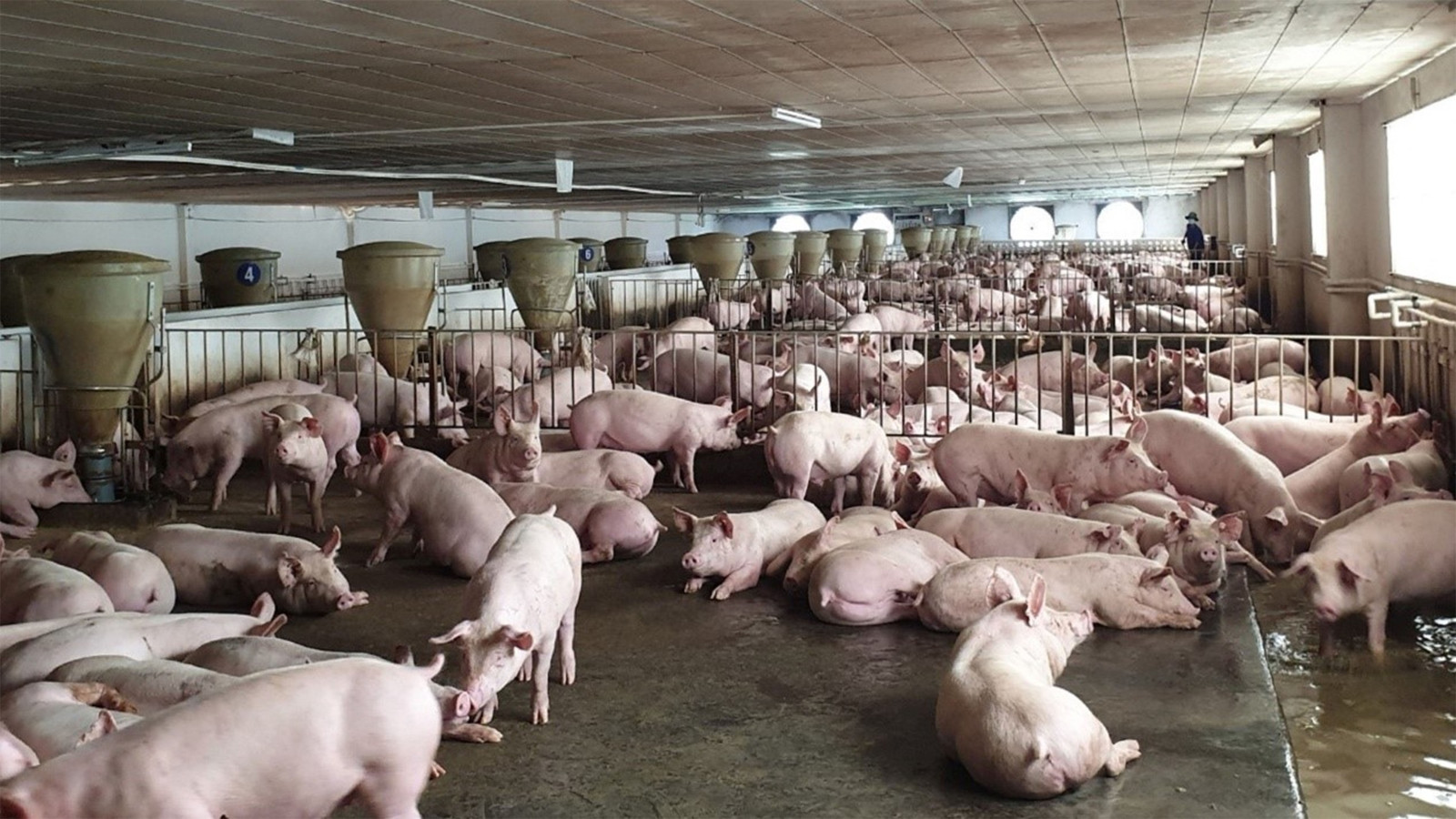Development of livestock farming towards farm-based approach
In recent times, the livestock industry in the province has undergone positive changes. The agricultural sector has also shown interest in investing and shifting production methods, improving the quality of animal breeds, promoting production and consumption linkages, and aiming for sustainable farm-based livestock farming.

The agricultural sector continues to develop large-scale, concentrated livestock farms, ensuring biosecurity.
Livestock farms are increasing.
According to the Department of Livestock, Veterinary and Aquatic Products, the closed barn and cold storage model in pig and chicken farming brings high economic efficiency. The province currently has many pig farms linked to companies such as Ba F, CP, CJ Vina, Japfa, Làng Sen, Anova-Farm, CJ-Agri, Vĩnh Tân among others. Investment companies in breeding, food, veterinary medicine, and livestock farmers invest in building farms, equipment, and care. Currently, there are 262 pig farms, an increase of 7 farms, a 2.7% increase compared to the same period in 2022.
According to many livestock farmers, small-scale pig farming is unstable in terms of market demand and is vulnerable to disease outbreaks, resulting in frequent losses. On the other hand, developing large-scale pig farming brings tangible economic benefits and contributes to the transformation of production structure and diversification of livestock breeds. This shift in mindset encourages farmers to transition from small-scale farming to farm-scale operations, reducing the risk of disease and minimizing environmental pollution.
In addition, cattle farming on a farm scale has become more popular and developed towards crossbreeding with specialized meat breeds. Farmers are utilizing embankments and inefficient agricultural land to grow grass and make use of agricultural by-products, resulting in stable efficiency. At the same time, many projects and investment support programs for cattle farming have contributed to the overall development of cattle herds. In line with this, the agricultural sector is also promoting the concentrated poultry farming model, combining environmental protection and disease safety. The province currently has 147 farms, with a total of 8,079,578 poultries, accounting for 68% of the total flock.
Mr. Tran Phu Cuong, Director of the Livestock, Veterinary and Aquaculture Department, stated that in recent times, in order to effectively control diseases in livestock and poultry, the agricultural sector has been promoting vaccination for livestock breeders to prevent outbreaks. In 2023, the livestock industry will continue to focus on disease prevention and control, specifically targeting avian influenza, foot-and-mouth disease (FMD), African swine fever, and avian flu, applying preventive measures, detoxification and closely monitor the disease situation to prevent widespread transmission.
In 2023, the poultry industry, under the supervision of the veterinary department, carried out free vaccination campaigns in small-scale livestock households, administering a total of 1,196,406 doses, reaching 38.8% coverage. Farms that self-administered vaccinations under the supervision of local veterinary authorities administered a total of 4,902,244 doses. Additionally, 1,379,530 doses of foot-and-mouth disease vaccine were administered to pigs, achieving 81.2% coverage in 2023. Classic swine fever vaccinations reached 1,387,963 doses, covering 81.7% of the population. Lastly, blue ear disease vaccinations were administered to pigs. The veterinary industry has administered 4,330 free doses of vaccination to livestock households. In addition, the sector also administered 13,447 doses of foot-and-mouth disease vaccine to buffaloes and cows, achieving a vaccination coverage of 32.5%. Furthermore, the veterinary department carried out free vaccination of 4,800 doses for livestock households to prevent the spread of the disease.
Continuing the development of concentrated livestock farming
Mr. Tran Phu Cuong stated that the industry will continue to focus on building a model for the development of small-scale industrial livestock farming, with control and the application of advanced scientific and technical knowledge in areas such as breeding, feed, and livestock farming processes. Enhancing the construction of livestock models to ensure biosecurity and promote good livestock practices, source traceability, increased productivity and product quality, while minimizing environmental pollution. Priority should be given to developing integrated livestock models that cover the entire production, slaughter, and consumption chain.
The agricultural sector of the province continues to develop livestock farming in the direction of farms, enhancing linkages, and replicating effective scientific and technological livestock farming models. At the same time, the sector encourages and supports the formation of linkages between farmers and businesses to ensure shared responsibilities and benefits among parties, avoid risks, help consumers trace the origin of products, and balance the supply and demand of livestock products.
Chain linkages will avoid the situation of devalued livestock products, ensuring a guaranteed supply of quality meat and profitability for farmers. In this regard, businesses play a crucial role in ensuring the main factors such as feed sources, good breeding stock, and farm management techniques that meet environmental requirements, providing technical support to farmers and facilitating product distribution.
Reported by Thoai Phuong – Kim Chau – Translated by Vi Bao

